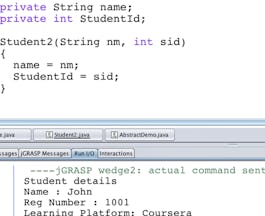Filter by
Subject
Required
Language
Required
The language used throughout the course, in both instruction and assessments.
Learning Product
Required
Build job-relevant skills in under 2 hours with hands-on tutorials.
Learn from top instructors with graded assignments, videos, and discussion forums.
Get in-depth knowledge of a subject by completing a series of courses and projects.
Earn career credentials while taking courses that count towards your Master’s degree.
Level
Required
Duration
Required
Skills
Required
Subtitles
Required
Educator
Required
Results for "child"

Coursera Project Network

University of California San Diego
Skills you'll gain: Computer Programming

Board Infinity
Skills you'll gain: HTML and CSS, Javascript, React (web framework)
 Status: Free
Status: FreeNational Taiwan University

Nanjing University
Skills you'll gain: Algebra, Calculus, Mathematics, Programming Principles, Computational Logic, Computer Programming, Problem Solving, Differential Equations, Python Programming, Theoretical Computer Science

Skills you'll gain: Java Programming

Coursera Project Network
Skills you'll gain: Javascript, Programming Principles
 Status: Free
Status: FreeNational Taiwan University
 Status: Free
Status: FreePeking University
 Status: Free
Status: Free Status: Free
Status: FreePeking University

Skills you'll gain: Computer Programming, Computer Science
In summary, here are 10 of our most popular child courses
- Create a Record of Students using Abstraction in Java: Coursera Project Network
- Learn to Teach Java: Inheritance and Recursion: University of California San Diego
- React Fundamentals: Board Infinity
- 東亞儒學:孟子一(East Asian Confucianisms: Mencius (1)): National Taiwan University
- 计算机系统基础(一) :程序的表示、转换与链接: Nanjing University
- Introduction to Software Development: Amazon
- Web Development in React.js: Development Basics: Coursera Project Network
- 東亞儒學:孟子二 (East Asian Confucianisms: Mencius(2)): National Taiwan University
- 生物演化: Peking University
- L’Egitto prima e dopo i faraoni. Dalla nascita dello Stato (3000 a.C. ca.) alle prime comunità cristiane (IV secolo d.C.): Sapienza University of Rome










